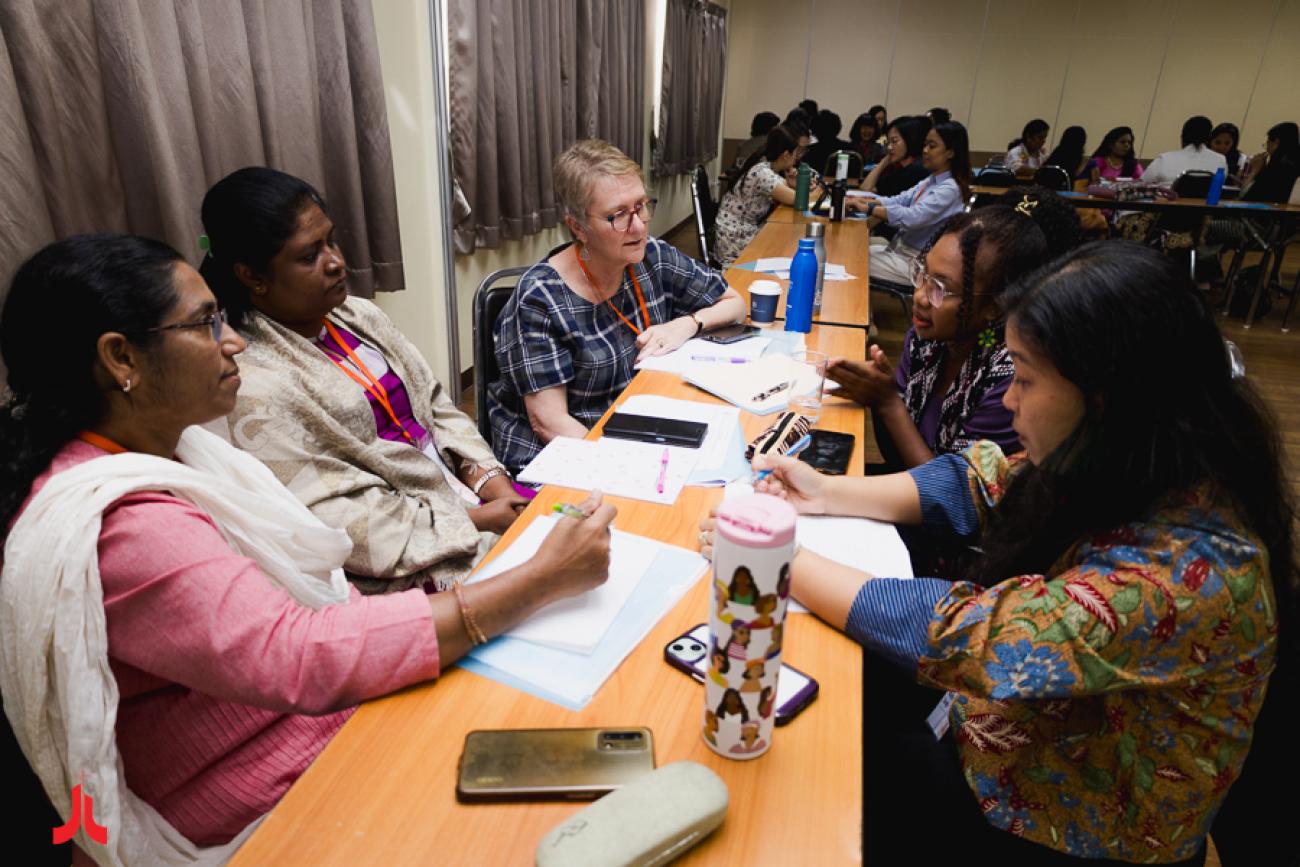Asian church women share harrowing instances of violence against women and stress for urgent action to ensure gender justice

Group discussion during the workshop on ‘Faces of Violence Against Women and Girls in Asia’
Bangkok, Thailand: The second day of the Asia regional consultation, organsied by the Christian Conference of Asia (CCA), on ‘Gender-Based Violence and Forced Migration of Women: Towards Strengthening Gender Justice Advocacy’ featured active and in-depth discussions on the ongoing widespread violence against women in Asia, and the need for gender justice advocacy within churches.
During the workshop on ‘Faces of Violence Against Women and Girls in Asia’, participants shared harrowing instances of violence in their countries including intimate partner violence, sexual violence, femicide, human trafficking, harmful practices, online abuse, and structural violence. Through powerful imagery, they brought to life the brutal realities women face across Asia, using symbols of violence and injustice to shed light on their suffering and resilience.
The contextual Bible study presented by Rev. Jung Eun (Grace) Moon of CCA on the Samaritan woman at the well (John 4) highlighted how women’s struggles can become sources of strength and healing for others, posing the question, "How can we put our woundedness in the service of others?"
“The story of the Samaritan woman, an outcast burdened by shame, illustrates how an encounter with Jesus led to healing, transformation, and the turning of her wounds into strength”, Rev. Moon explained in the Biblical exposition.
Nelun Chrisanthi Gunasekara, a seasoned gender trainer from Sri Lanka, led an engaging session on ‘Achieving Gender Equality: The Rights and Empowerment of Women and Girls’. She urged participants to critically examine their specific contexts and evaluate the legal and policy frameworks in their countries, identifying factors that either support or hinder progress.
Highlighting the importance of meaningful empowerment, Ms Gunasekara stated, “Empowering women should take into consideration their realities and contexts, and be meaningful rather than driven by actions that may inadvertently disempower them.”
“Meaningful change does not solely occur at the national level; it begins at home, where small, intentional actions can pave the way toward achieving gender equality”, Ms Gunasekara reminded the participants.
Dr Young Mi Cho of the Presbyterian Church of Korea led a session on ‘Women and Men Partnership in Combating Gender-Based Violence: A Collaborative Approach’ and emphasised the importance of involving men in the gender equality movement.
Dr Cho stressed that as gender conflicts rose, there was an urgent need for inclusive policies that engaged men in gender equality efforts. She noted, “Analysing and strengthening policy and legal frameworks based on evidence of what works and what does not is key to the success of gender equality initiatives.”
Evidence suggested that significant progress was still needed in Asia, with potential for increasing male and boy participation in gender equality initiatives. To break the cycle of violence tied to masculinity and further gender equality, national policies must adopt an integrated approach, which includes dialogues on masculinity, addressing the trauma and mental health challenges faced by men, and encouraging emotional self-care.
“We need to take steps to ensure that women and men have equal rights, opportunities and responsibilities in all spheres of society. We need to emphasise that gender reform is important, meaning that it should not only focus on the inequalities that women experience, but also on the challenges that men face in an unequal society and on issues of difference and diversity among men, so that men and women can work in partnership”, stated Dr Cho.
A three-member panel of church women activists from Bangladesh, the Philippines, and South Korea explored ‘Gender Justice Advocacy in Churches’ and shared insights into the Church’s response to the growing issues of gender-based violence.
Daisy Roy, Executive Secretary of the National Council of Churches in Bangladesh (NCCB), addressed the challenges of advancing gender equality and women's rights within the country's predominantly Islamic cultural context. Key obstacles included early child marriage, limited access to education for women, and widespread societal discrimination. In response, the NCCB has launched initiatives such as gender equality workshops, child education programmes, and advocacy efforts to promote women's rights.
Sheena Camille Calma, programme coordinator for the United Methodist Church's Women's Programme, highlighted the primary challenges tackled by the church, such as gender-based violence in church spaces, inadequate institutional responses, and various other forms of discrimination.
She shared how the Methodist Church in the Philippines has implemented leadership training, social justice ministries, and human rights campaigns to combat oppression, raise awareness, and promote equity. These initiatives aim to create inclusive and equitable spaces while advocating for gender justice, encouraging communities to unite in driving meaningful change.
Dr Hyunju Lee of the Presbyterian Church in the Republic of Korea addressed the alarming rise of sexual violence and its far-reaching effects on South Korean society, particularly within the church. She highlighted key issues such as femicide, deepfake pornography, and the abuse of power by church leaders through grooming.
Dr Lee added that, in response to these growing concerns, efforts have been made to introduce gender equality codes, amend church policies, and provide comprehensive counselling and training. However, she noted that despite these positive developments, significant challenges persist in South Korean church and society, including deeply entrenched patriarchal culture and resistance from some church leaders.
The consultation, organised as part of the CCA’s Ecumenical Women’s Action Against Violence (EWAAV) programme, is being attended by 34 women representatives from various Asian churches.










